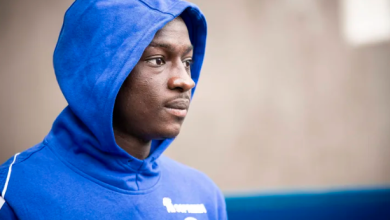Determining the most underrated Leeds United players of all time involves looking at those who made significant contributions but didn’t always receive the recognition they deserved, either due to playing in less glamorous roles, being overshadowed by teammates, or lacking the spotlight of modern media. Below is a ranked list from 1 to 10, with explanations for each player’s ranking and why they are placed above those below them. The rankings consider their impact, lack of recognition relative to contributions, and the context of their era, based on historical accounts and fan perspectives.
1. Nigel Martyn (Goalkeeper, 1996–2003)
Why Underrated: Martyn is often cited as Leeds’ greatest-ever goalkeeper, yet he’s rarely mentioned among the Premier League’s elite keepers of his era, overshadowed by names like David Seaman and Peter Schmeichel. He made 273 appearances, played a pivotal role in Leeds’ UEFA Cup and Champions League semi-final runs (2000 and 2001), and was named Leeds’ Player of the Year in 1997. His £2.25 million transfer fee in 1996 was a British record for a goalkeeper, but his consistent excellence was underappreciated outside Leeds due to limited England caps (23, often as Seaman’s backup).
Why Ranked Above Others: Martyn’s critical saves and reliability in high-stakes European matches gave Leeds a platform for success that no other player on this list matched in such a specialized role. His lack of global recognition despite being a top-tier keeper places him above others who, while underrated, had more positional visibility or fanfare.
2. Lucas Radebe (Defender, 1994–2005)
Why Underrated: Known as “The Chief,” Radebe’s versatility (playing midfield and across the backline) and leadership as club captain from 1998–2000 were vital during Leeds’ late ’90s and early 2000s resurgence. He made over 200 starts, led South Africa to their first World Cup in 1998, and took a pay cut to stay loyal during financial turmoil. Despite inspiring a band (Kaiser Chiefs) and earning the FIFA Fair Play Award in 2000, his global recognition pales compared to contemporaries like Rio Ferdinand, who left Leeds for greater fame.
Why Ranked Above Others: Radebe’s loyalty, versatility, and cultural impact (both at Leeds and in South Africa) give him an edge over those below. His understated presence in a star-studded squad and lack of mainstream hype despite captaining a top side place him just below Martyn, whose positional rarity as a keeper edges him out.
3. Gary Kelly (Right-Back, 1991–2007)
Why Underrated: Kelly made 325 Premier League appearances and 51 caps for Ireland, playing in two World Cups. A one-club man, he was a consistent right-back during Leeds’ Champions League semi-final run in 2001, yet his name rarely surfaces in discussions of great Premier League full-backs. His longevity (debut in 1991/92, retired in 2007) and reliability went unnoticed outside Leeds, overshadowed by flashier teammates like Harry Kewell.
Why Ranked Above Others: Kelly’s long-term consistency and defensive solidity in a high-achieving Leeds side outshine the contributions of those below, who either had shorter tenures or less impact in major competitions. His lack of recognition compared to other full-backs of the era ranks him below Radebe, whose leadership and broader influence were more pronounced.
4. David Batty (Midfielder, 1987–1993, 1998–2004)
Why Underrated: A Leeds native, Batty made 220 appearances across two spells, playing a key role in the 1991–92 First Division title and 1989–90 promotion. Known for his tenacious tackling and work rate, he was the unsung hero in a midfield with stars like Gordon Strachan. His 4 goals in 220 games reflect his defensive focus, which earned him less fanfare than attacking players. Nationally, his 42 England caps were underappreciated due to his no-frills style.
Why Ranked Above Others: Batty’s pivotal role in Leeds’ last league title and his local connection give him an edge over those below, who didn’t contribute to a championship. He ranks below Kelly because his midfield role garnered slightly more attention than Kelly’s less glamorous defensive position, and his time away from Leeds diluted his club legacy compared to Radebe’s loyalty.
5. Paul Madeley (Utility, 1963–1980)
Why Underrated: Madeley’s versatility was legendary, playing every position except goalkeeper during his 536 appearances under Don Revie. He won two First Division titles (1968–69, 1973–74), the FA Cup (1972), and two Fairs Cups, yet his lack of a fixed role meant he was often overshadowed by stars like Billy Bremner or Norman Hunter. His quiet demeanor and 24 England caps (far fewer than his talent warranted) kept him under the radar.
Why Ranked Above Others: Madeley’s adaptability and success across multiple eras of Leeds’ golden age surpass the contributions of those below, who played in less successful periods or had narrower roles. He ranks below Batty due to Batty’s direct impact on a modern title win, which carried more weight in a competitive era.
6. Tony Dorigo (Left-Back, 1991–1997)
Dorigo made 208 appearances, providing pace and pinpoint crosses that set up many goals for Lee Chapman during the 1991–92 title-winning season. His positional awareness earned him 15 England caps, but he was rarely celebrated compared to attacking stars or even other defenders like Kelly. His contributions were vital but often overlooked in a team with bigger names.
Why Ranked Above Others: Dorigo’s role in a championship-winning side and his technical ability as a modern full-back place him above those below, who didn’t contribute to a title. He ranks below Madeley because his shorter tenure and less versatile role had a narrower impact on Leeds’ overall history.
7. Dominic Matteo (Left-Back/Defender, 1997–2004) Matteo made 275 Premier League appearances across multiple clubs, including 115 for Leeds, where he scored two Champions League goals in 2000–01. His versatility and reliability were key during Leeds’ European campaigns, yet he’s rarely mentioned among the era’s top defenders. His Scottish caps (6) and lack of media spotlight added to his underrated status.
Why Ranked Above Others: Matteo’s European contributions and defensive consistency in a high-profile Leeds side outshine the players below, who had less impact in major competitions. He ranks below Dorigo because Dorigo’s title-winning contribution and longer Leeds tenure carry more weight.
8. Gary Speed (Midfielder, 1988–1996)
Speed made 312 appearances and scored 57 goals, contributing to the 1991–92 title. His work rate, versatility, and leadership were immense, but he was overshadowed by flashier teammates like Strachan. His 85 Wales caps and later recognition at other clubs highlight how his Leeds contributions (0.18 goals per game) were underappreciated at the time.
Why Ranked Above Others: Speed’s title-winning role and consistent output place him above those below, who didn’t play in a championship side. He ranks below Matteo because his midfield role garnered more attention than Matteo’s defensive contributions, and his later fame elsewhere slightly reduces his “underrated” status at Leeds.
9. Paul Reaney (Right-Back, 1962–1978)
Reaney made nearly 750 appearances, winning two First Division titles, the FA Cup, and two FA cups, Reaney was a pioneering overlapping full-back whose pinpoint crossing and defensive discipline shut down wingers like George Best. Despite his reputation (Best rated him among the best defenders he faced), he was overshadowed by Revie’s more flamboyant stars like Bremner or Lorimer. His 37 England caps were fewer than his talent deserved.
Why Ranked Above Others: Reaney’s longevity and tactical innovation as a full-back place him above Yeboah, whose shorter tenure and flashier style earned him more attention. He ranks below Speed because Speed’s title-winning role in a more competitive era and broader positional impact (midfield vs. full-back) carry slightly more weight.
10. Tony Yeboah (Striker, 1995–1997)
Yeboah scored 24 goals in 47 Premier League games, including iconic strikes like his volley against Liverpool. Despite being one of Africa’s greatest Premier League players, his short stint (47 appearances) and lack of sustained media hype compared to contemporaries like Alan Shearer mean he’s not celebrated as much as his goal-scoring prowess warrants.










